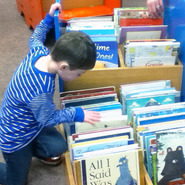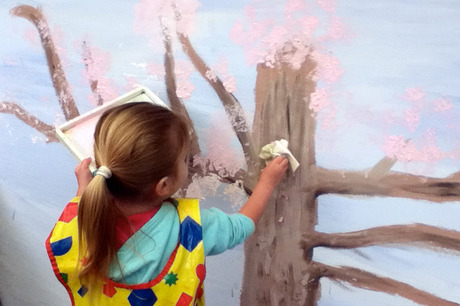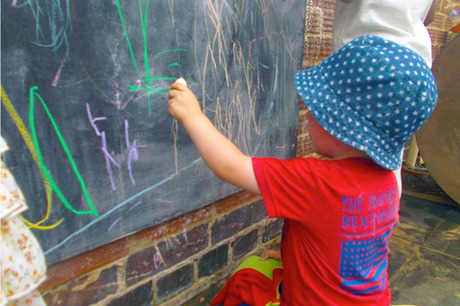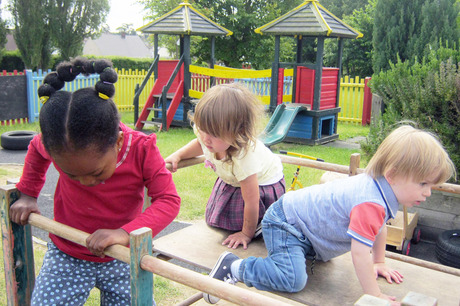on getting young children to engage with their local communities.
Marianne Sargent finds out how it is taking shape.

Six English early years settings are currently participating in a three-year European Union-funded project, which aims to explore democratic involvement of young children in public and civic spaces.
The Young People, Public Spaces and Democracy Project (BRIC Project), led by Professor Tim Waller of Anglia Ruskin University, aims to raise the profile of young children as stakeholders within local communities by bringing early years professionals, parents, local residents, politicians and business leaders together to enable children's voices to be heard outside the nursery.
Early years practitioners from Under Fives Roundabout pre-school and Beach Babies day nursery from Cambridge, Chase Lane Primary School and Nursery Unit in Waltham Forest and Whitehills Nursery School, Parklands Nursery School and Croyland Nursery School from Northampton are working with colleagues from another 12 settings in Italy and Sweden to find ways of making local communities more aware of their youngest citizens, as well as presenting their views to policymakers and politicians.
'The aim is to demonstrate that democratic engagement in public spaces is important for everybody and starts at an early age,' explains Professor Waller. 'That collaboration between children and adults and what's going on in a public space is vital going forward.
'Often when new buildings and play parks are being designed, children haven't been consulted about what goes in them.
'There are still many public spaces that are adult dominated and it's about raising the awareness of children's perspectives.'
Professor Waller adds, 'Unless you have your own children in pre-school education or you're a grandparent, you don't necessarily know they're there because they're shut away in these buildings, which in England have got these horrible green fences around them.'
The project involves taking children out to explore three public spaces: the pavement, an outdoor green space and an indoor space that is not a school. While the children are out, they are supported in interacting with the people within their community and encouraged to leave a mark of some sort as a reminder of their presence.
Professor Waller explain, 'When the children go out they are leaving traces, which are not necessarily permanent, so they might make chalk marks or do drawings.
'We are hoping to leave more permanent traces, which might be professionally produced posters of the children's drawings or reflections on the experience of going out into the community attached to lamp posts or notice boards or walls. It's about getting children out in the community and saying they're here and want to have a say in what's going on.'
He adds, 'The most important thing is working with the community to acknowledge that young people have a part to play and helping the children become aware that the space is theirs as well.'
Three of the six English settings participating in the project are part of the Northamptonshire Nursery Schools Partnership. Here, we look at their experiences so far.
RAISING PROFILE
Whitehills Nursery School
Jan Waller, head teacher of Whitehills Nursery School, explains why she feels that the BRIC project is so important.
'Nursery schools are under threat at the moment, our funding is being squeezed and we don't really know what the future holds. A lot of people don't really understand what a nursery school is. So, this is to show people that they do have these children in the community and this is what the children are doing in their schools.
'Children are rarely asked for their ideas about where they live and if we wish them to develop into responsible citizens they need to form a sense of responsibility and attachment to their own community. We are slowly trying to make links so that people are aware that they are here and they are part of that community.'
 Mrs Waller says the children have been going on regular walks and taking trips out using public transport as a way to meet and greet local residents. 'We've walked through the local neighbourhood and the children have been chatting to people about what they have seen and what they do. We've also been out to the public library by bus. The response of the people on the buses was really positive - all interested in where we were going and why. Sadly, it seems to have become quite a rarity to see children out and about and we feel it is important for the community to see what work we are doing with the children.'
Mrs Waller says the children have been going on regular walks and taking trips out using public transport as a way to meet and greet local residents. 'We've walked through the local neighbourhood and the children have been chatting to people about what they have seen and what they do. We've also been out to the public library by bus. The response of the people on the buses was really positive - all interested in where we were going and why. Sadly, it seems to have become quite a rarity to see children out and about and we feel it is important for the community to see what work we are doing with the children.'
Mrs Waller explains how the children have been leaving traces to make the public aware of their activities. 'We now have a display up in the library of the children on their visit. Most recently we visited a local business, a geranium nursery.
'The children created wonderful paintings following the visit and one of these was framed and taken to the nursery to be displayed at checkout. One member of the geranium nursery staff commented on how lovely it was to hear the children's voices in there.
'We are also reproducing a large-scale piece of art that the children have worked on together, inspired by our beautiful cherry tree in full bloom. This is being printed onto a big banner, together with some photos of the children creating the artwork and a short explanation. The banner will be attached to the front fence of our nursery in full view of all who pass.'

Mrs Waller says it is vital that young children should be given a chance to actively participate in their local communities. 'Places like Italy and Sweden have much more emphasis on democracy and children's voices and listening to what children are saying, which is part of really good early years practice. We do it in the setting, but we don't really take it into the community.
She adds, 'Although the children are very young and it was quite hard work initially to get responses from them, unless we do that work with them they are not going to develop into people with a responsibility for their own community.'
She says parents have also been very supportive of the project, commenting on how beneficial it is for the children in terms of developing their personal social skills and road safety awareness.
LISTENING TO THE CHILDREN
Croyland Nursery School
Executive assistant head of Croyland Nursery School Jo Putman explains the importance of carrying out the project in collaboration with the children. 'We had staff meetings and thought about where we'd like to go, but then decided that we should ask the children because it's not about us, - it's about them. It's about the children having a voice,' she says.
'I took photos of the locality and found some aerial shots of the nursery school and the surrounding area. I put the photos out on a table and sat down with whoever was interested. The children were very interested because they've never really seen aerial views. We spent a long time looking and talking.
'We then took the children out with cameras and let them explore. We went to a local green area and they took photos and spoke about what they liked. Then when we got back they plugged the cameras into the computer and we helped them to print the photos. We talked about what we'd seen and I asked them what they'd liked. We spoke about the trees and they said it would be nice if things were hanging from them.
'Since then we've been to a park and asked the children to find some natural resources to make something, anything they wanted. As we were leaving I said it would be really lovely if their creations were still there next week, which obviously they weren't because it's a public space.
'When we went back the following week, they were quite annoyed that their things had gone and so I explained it is not just for us, it is not a nursery, it is everyone's space, so we need to think about what we could leave there that would always be there.
'So, we've got them thinking about how we could leave our mark. We are thinking about maybe taking chalk down to make some marks and pictures. Then obviously they won't be there the following week because it'll probably rain and we can talk more about it then.'

Miss Putman believes the project is having a positive impact not only on the children, but also the local community. 'I think it's just a lovely thing to have the children involved,' she says.
'Not many of the children get out and walk around. Quite a lot of them drive in at 8am in the morning and don't go home until 6pm. So, for the majority of their time they're in nursery. It's getting them out and about and exploring and looking and listening to what is going on.
'When we've walked past, people have been smiling and happy. We should be teaching the children that we can be polite when we walk past and that it is okay to say "Good morning". I'm not saying that we're going to go and talk to strangers, but just be polite. It's nice for the community that we're encouraging children to do those things.'
MIXED RESPONSE
Parklands Nursery School
Head teacher Sarah Brooking says the children at Parklands Nursery School were met with a mixed response when they ventured out on their first walk around the streets of their local neighbourhood.
'In the morning we took out jumbo chalks so the children could make marks on the pavement,' she explains. 'Unfortunately, there was a mixed reaction to that and we are dealing with the fallout.
'One person was lovely and came and sat with the children and said, "It's so lovely to see the children out. This is what we used to do when we were young; we would play in the streets and chalk hopscotch on the roads." But there were several other people who called it graffiti.'
Mrs Brooking points out that both nursery staff and the children have already learned a great deal from the experience. 'Some of the children did write on the fences with the chalk and that was personal property, not public property,' she explains.
'So when we came back we talked to those children who had drawn on the fences and then we went back out and washed it all off. It's given them an understanding that this is their community, but they should respect the other people who live in it as well.'
She explains how they plan to turn a negative experience into something positive. 'We went out again in the afternoon, around the same areas where we'd had complaints, but this time we didn't take chalks, we just sat in the sunshine and chatted. I invited people to come to talk to us and the children, but they didn't.
'I've spoken to the local councillor and he's taken it to the residents' association meeting and I'll be going to the next meeting so that our voice is heard,' Mrs Brooking says.
'We are going to do a little project with the councillor and invite residents into the nursery for a cream tea. We are also going to give those who made particular complaints personal invitations to come in for our family gardening day.
'Although it was a mixed experience, there's going to be quite a few positive outcomes out of it, working with the community and helping the children to stake a claim within the community alongside the adults.'

MORE INFORMATION
BRIC Project, www.bricproject.org
Croyland Nursery School, www.croylandccandnurseryschool.co.uk
Parklands Nursery School, www.parklandsnurseryschool.co.uk
Whitehills Nursery School, www.whitehillsnurseryschool.co.uk.









